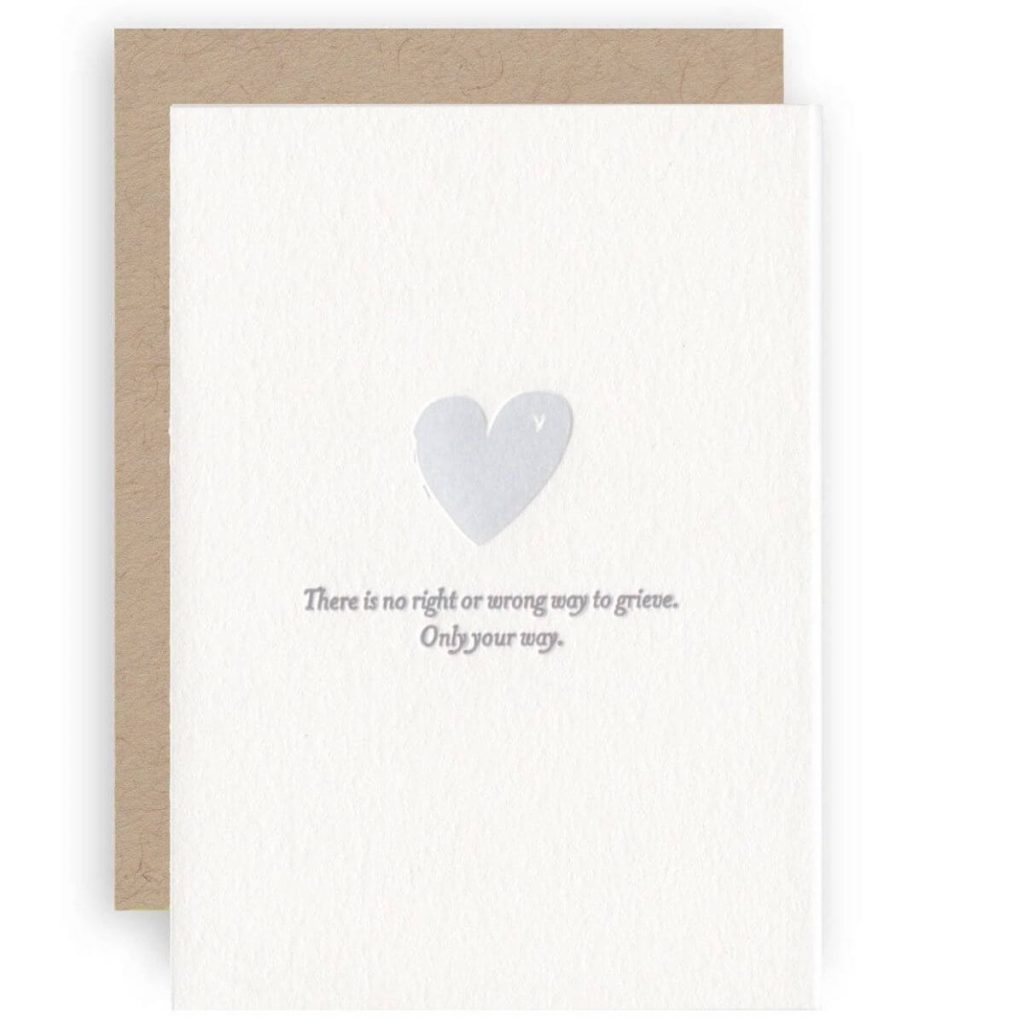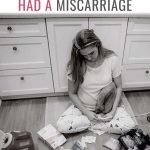When I was going through recurrent miscarriage, I wished desperately that people would stop saying hurtful things. They always meant well, and I knew it, and yet my heart left so many conversations a bit more scarred than before. Are you wondering what to say to someone who had a miscarriage? You’re in the right place.
The answer, of course, is complicated. The short answer: Listen actively, and think before you act or speak.
The reality, which many readers have pointed out to me, is that there is nothing you can say to make things better when someone you love experienced a miscarriage. The best thing you can do is be an open ear.
Say “I love you” or “I’m here.” But what matters most is not what you say. It’s that you listen, plus think before you speak.

This site contains affiliate links, meaning that we earn a small commission for purchases made through our site. We only recommend products we personally use, love, or have thoroughly vetted.
How to comfort someone who had a miscarriage
Helping a friend or loved one through miscarriage is HARD, but it’s worth so much.
Here are the three most important things you can do to be an empathetic, loving friend or family member to someone who had a miscarriage.
1. Send Miscarriage Words of Encouragement
If you want, you can send a miscarriage gift. It’s not necessary, and “things” won’t take the pain away. But gifts DO show your love, which truly helps many grieving parents.
More than anything, we recommend sending a card.
Whether or not you send a gift after someone experiences pregnancy loss, we recommend that you send a card. We LOVE this one from KB Paperie Co.

Loss cards are really helpful because they show you care, and they often find the right words for you.
Most women experiencing miscarriage feel isolated, and people find having something physical to hold (like a card) can be a comfort to someone who experienced pregnancy loss.
2. Know how to give support after miscarriage
When I was going through recurrent miscarriage, I had friends who were just there.
They didn’t mind if I didn’t answer the phone. They didn’t get upset if I didn’t want to see them. They let me off the hook for social engagements and other things I would normally be present for.
This, to me, was the epitome of support: they showed they cared by sending cards, flowers, and texts. They showed up with miscarriage supplies and listened when I talked about my grief.
I’ll remember, love, and appreciate those people as long as I’m living.
To be a good support person, you simply need to be present and available. Show up emotionally. That’s all.
3. Be Thoughtful
Ultimately, all of this advice comes down to thoughtful sympathy.
To know what to say to someone who had a lost a baby or pregnancy, think about how what you say could be interpreted by a grieving soul.
Choose your words, actions, gestures, facial expressions, and other body language carefully.
Remember that this is not about you: it’s about those who are grieving. These steps will allow you to be a thoughtful support person.
- Listen actively
- Discover where they are in the physical process and in their grief
- See how open they are to discussion
- Follow their lead
What Not to Say to Someone Who Had a Miscarriage
Let me be clear. When it comes to what TO say to someone who miscarried, the list is SHORT:
- “I’m sorry”
- “I love you”
- “I’m here”
- “This is not your fault!”
Nothing you say can make remove the pain that’s been left upon our hearts. But it’s really easy to say things that unintentionally make our grief worse.
If you’ve said these things before, no worries. You were doing your best and we all make mistakes. Don’t dwell on it.
But from here forward, stick to the few things we know to say, and use your actions to show love. And learn from this list of things NOT to say to care for the mental health of the grieving person you love.
1. Don’t say, “At least . . .”
Beginning a sentence with “at least” minimizes the griever’s experience. It suggests a silver lining to a major physical and emotional trauma.
It’s not that silver linings don’t exist, but in the moment of the trauma, most people aren’t in a place to process the bright side.
Examples of such statements that you should absolutely not say:
- “At least you know you can get pregnant.”
- “At least you weren’t further along.”
- “At least you’re young; you have plenty of time.”
- “At least it happened at a time when things are slow at work.”
- “At least you already have (a) healthy child(ren).”
- “At least it wasn’t actually a baby.”
The last one is common for very early losses, or for people who suffer from blighted ovums (the pregnancy begins but the embryo never develops, despite a gestational sac growing normally.)
No. Just no. Don’t you dare say that!
2. Don’t say, “You can try again soon”
Talking about trying again is tricky. Some women are terrified to try again, while others are desperate to get that process rolling.
Some women spent years of stress and tears and doctors appointments and ovulation tests and shots and hormones and IVF treatments and dollars to get to the pregnancy they lost.
“Trying again” can be very loaded. Only discuss it if they bring it up.

3. Don’t say, “I’m sure . . . “
“I’m sure” is sort of like “at least.” It’s not minimizing, but it’s still an absolute no.
A miscarriage is a brutally stark reminder that nothing is certain. It makes most people who experience it question many of their beliefs about life, fairness, certainty, control.
Saying “I’m sure” suggests a certainty that you don’t have.
- You’re not sure it’ll be different next time
- You’re not sure that it was an unhealthy baby
- You’re not sure there was a good reason for this loss
Empty assurances are upsetting. They make you feel better, not the person you’re trying to comfort.
When you try to assure a griever of something you can’t be sure about, you’re really reminding them about the vast chasm between their experience and your understanding of it.
4. Don’t say, “This is really common”
Yes. Yes miscarriage IS common. It’s true. 1 in 4 pregnancies ends in loss. And this comment helps a few women, but not most.
While it’s important to understand how common miscarriage is because it helps women experiencing it understand they’re not alone, your intention may be misconstrued.
Hearing that miscarriage is something that happens all the time minimizes the accompanying grief, as if losing a pregnancy somehow matters less because it happens frequently.
5. Don’t say anything that projects your belief system onto someone else
This is true even if you know that person generally shares similar beliefs.
Examples:
- “Everything happens for a reason.”
- “This baby just wasn’t part of God’s plan.”
As a support person, please leave such faith-based ideas to the grieving parents.
They may not believe what you do, or they may simply not be ready to hear it.
If they bring it up, then go with it. But please don’t be the first to mention anything faith-based.
6. Don’t say, “When you do have a baby, you won’t be able to imagine life with a different one”
The weird thing about this one is that it’s usually true, but a grieving mother is not ready to hear it.
Also, one baby does not replace another.
I still mourn all of my losses, but I also know I wouldn’t have my precious, snuggly, extroverted, feisty little guy if I’d had any of the babies I lost.
I wouldn’t trade Jack for anything.
But that’s something I had to learn for myself later. It’s not something to bring up during trauma.
7. Don’t say, “Just Pray”
Maybe this is a Southern bible belt thing, but I have heard it so much and it hurt me to the innermost depths of my core.
Why?
Every time someone told me I should pray, I felt like they were blaming me for my miscarriage.
What someone said: “Just pray about it.”
What I heard: “If only you’d prayed harder/better/more authentically, then this wouldn’t have happened.”
I know this isn’t what people meant, but again, it’s not about what you mean. It’s about what’s being interpreted by a grieving soul.
8. Don’t say anything that could be construed as casting blame
Let me give you some facts.
A miscarriage did not happen for any of the following reasons:
- Something the mother did
- The beer she had before she knew she was pregnant
- The cup of coffee she drinks each morning
- The fact that she didn’t cut back at the gym
When I had my first miscarriage, my doctor looked me straight in the eye and said something so important:
“You did nothing to cause this, and you could’ve done nothing to cause this. Short of jumping out of an airplane, there is nothing you could have done. It’s something that happens for a number of reasons that we know, and a number of reasons we still don’t know. Nothing you have or haven’t done could’ve changed the outcome. This is not your fault.”
Dr. Nadine Becker
Let me repeat that last part one more time for the crowd:
MISCARRIAGE IS NOT THE MOTHER’S FAULT!
47% of mothers report blaming themselves for a miscarriage. They aren’t to blame. Remind them!
What TO say to someone who had a miscarriage
When someone is experiencing trauma, they process information differently than normal.
What you mean is not necessarily what they hear.
Try to imagine anything you say from the perspective of the traumatized.
Imagine how the griever could negatively interpret any words you say, because negativity is their current default.
If they find positive spins, go with it, but don’t push them.
And let me reiterate one point. Even though I’ve given you plenty of alternatives of what to say, the reality is that you cannot say anything to make it better.
The best things to say, if you’re going to say something, are
- “I love you”
- “I’m sorry”
- “I’m here”
- “This is not your fault!”
The best thing to do for a friend who had a miscarriage is to be present and willing to listen. Nothing you say can take the pain away, but validating their grief and offering a listening ear is worth so much.
Tell your friend or family member that you love them and you’re here if they need you. Don’t offer advice or try to make things better. Simple an “I love you, I’m sorry, and I’m here” is perfect.
If you want to memorialize a miscarriage, consider a piece of remembrance jewelry, a miscarriage memento box or shadow box, or having a candle lighting ceremony to memorialize your loss.
Miscarrying families often report feeling isolated, and it’s important that they know they’re not alone. Be present, either in person or by phone or text. If you’ve had a miscarriage before, offer to share your story.
Other Miscarriage Articles
- What to expect when you miscarry
- Miscarriage tattoo ideas
- Books about miscarriage
- Why you don’t have to attend a baby shower after miscarriage
- Fathers dealing with miscarriage
- Dealing with a miscarriage after unplanned pregnancy
Miscarriage Stories
- Arden’s misoprostol experience
- Beth’s ectopic pregnancy story
- Whitney’s story of back-to-back miscarriages













Thank you so much for providing such important and comforting words and suggestions. I have passed this article to family members who are dealing with the loss of a pregnancy at 6 months. Such a challenging event for the Mom, Dad, and surrounding family and friends.